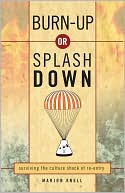

 |

|

The average rating for Burn Up Or Splash Down: Surviving the Culture Shock of Reentry based on 2 reviews is 4 stars.
Review # 1 was written on 2018-09-02 00:00:00 Craig Campbell Craig CampbellExcellent read for missionaries as well as for pastors leaving churches. |
Review # 2 was written on 2014-11-11 00:00:00 Brigette Mcnew Brigette McnewBurn Up or Splash Down (Colorado Springs: Biblica, 2007) appears to be the most recent edited volume available on missionary reentry. The subtitle suggest a broad scope that creates the expectation of a fairly comprehensive treatment of reentry. The book comprises three sections: one for missionaries reentering, one for TCKs reentering, and one for "the receiving end"'those serving reentering missionaries. This organization was unfortunate in a couple of ways. One, the book seems to have been written with the expectation that readers would only be interested in one section or another, so there is significant redundancy. Two, it is more disjointed than necessary, even for a book trying to take into account the multiple perspectives involved in the reentry process. It could have been more well integrated. As a missionary preparing for reentry, I found some of the many quotes from returned missionaries and some the author's own insights to be poignant, but overall I was unimpressed with the counsel offered. This volume has some interesting biases that future books on reentry should try to avoid. First, it seems weighted toward missionaries who have worked in really isolated places for long periods of time, resulting in disorientation about things like opening a bank account or using a cell phone. These examples come from the author's experience and should not be discounted, but much of the book is about dealing with this kind of extreme cultural ignorance and adjustment. In the globalized world, though, there is increasing need for a more nuanced approach to the dynamics of reentry that doesn't rely on the caricature of the bush missionary with kids who have never used Facebook. There are significant reentry issues to deal with that have nothing to do with such isolation'or with the failure to abide best practices while on the field, such as keeping up with financial and professional realities in one's passport culture. Second, the TCK section seems weighted toward older TCKs and is in fact written to them, thereby assuming a certain reading level. This effectively sidelines advice about younger TCKs. Most of the examples deal with adolescents or recent high school graduates. These need to be addressed, and other books dedicated to TCK issues are available, but it should be noted that the promise of a relatively comprehensive treatment of TCK reentry went unfulfilled. An additional problem marked the whole book in my view. A great deal of the advice seems to be essentially about basic life skills rather than issues specific to missionary reentry. Granted, the author would probably find the distinction pointless in the course of counseling, and maybe the lesson to learn is that missionaries are often people who lack basic life skills! But that is an implication I would have liked spelled out. A substantial portion of the TCK section, for example, was advice that any parent should give their kids as they go to college and that many college students struggle to do without, TCK or not. Is the author pointing out that a result of reentry is often poor parenting? That would be an important discussion. Instead, we get a litany of relatively common-sense advice. To suggest that it is not common sense to TCKs misses the point that it is not common sense to any new college student unless they have been taught. Similar advice marks the first section: for example, reentering missionaries will need good interview skills to secure a job. Who doesn't? Or, missionaries returning to a minority world context need realistic expectations about increased cost of living. Are there really returning missionaries who don't know the world economy isn't uniform? Ultimately, this approach undermines the basic premise of the book, which is that missionary reentry occasions unique concerns that deserve special attention. Finally, the section for supporters receiving returning missionaries could have included more process specifics. Furthermore, the chapter on debriefing, which was for some reason placed in the first section even though it is addressed primarily to supporters, should have been in the final section and included more procedurally as well. The volume is not without virtues. The first section in particular summarizes important ideas in an easy-to-read fashion. Yet, there is ultimately much to be desired in terms of substance. |
CAN'T FIND WHAT YOU'RE LOOKING FOR? CLICK HERE!!!